|
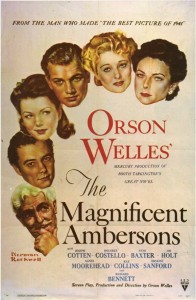
Synopsis:
An up-and-coming industrialist (Joseph Cotten) loves the wealthy daughter (Dolores Costello) of a local millionaire (Richard Bennett), but they each end up marrying someone else. When Costello’s spoiled son (Tim Holt) grows up, he falls for Cotten’s daughter (Anne Baxter), and Cotten renews his interest in Costello — but Holt’s disdain for Cotten prevents romantic happiness for all involved.
|
|
Genres:
- Agnes Moorehead Films
- Anne Baxter Films
- Historical Drama
- Joseph Cotten Films
- Orson Welles Films
- Rise-and-Fall
- Small Town America
Response to Peary’s Review:
In his review of Orson Welles’ adaptation of “Booth Tarkington’s [1918] Pulitzer Prize-winning novel,” Peary recounts just some of the film’s infamous production history, noting that “while Welles was out of the country, editor Robert Wise and his assistant, Mark Robson, were ordered by RKO to drastically cut the 131-minute picture that preview audiences didn’t like”. He argues that while many “critics now regard the mutilated version as being equal to Citizen Kane and other Welles classics”, he doesn’t “consider this to be one of his masterpieces”, and bluntly states that “the cutting hurts terribly”. However, he argues that “even if it were intact, it seems to be missing a lead character”, given that “Tim Holt’s George Minafer hasn’t enough stature to carry the latter part of the film”. Despite his complaints, however, he does concede that “Welles presents what may be the most effective look at late 19th-century small town life”, and notes that “the early montage, depicting changing styles… is memorable”. He feels that the “acting is uneven” but calls out Agnes Moorehead’s Oscar-nominated performance (playing Holt’s spinster “Aunt Fanny”) as “dynamic”, “especially when projecting near hysteria in her scenes with Holt”.
I don’t quite agree with Peary that the film is “missing a lead character”. As Peary himself notes, the “story, which is set between 1883 and 1912,” is more broadly about “the decline and fall of the Ambersons-Minafers, and the simultaneous modernization of their once-quaint small town — all due to the industrial revolution, which is emblemized by the advent of the automobile”. It’s this larger socio-economic theme which Welles is concerned with exploring, through the prism of Holt’s hopelessly spoiled and arrogant George Minafer, as well as through the star-crossed would-be romance between Costello and Cotten (who become Holt’s unwitting pawns). Ultimately, …Ambersons is more a film about clashing values in a life-changing era than any kind of straightforward melodrama with a recognizable central protagonist — which is perhaps what disappointed so many audience members at the time of its release.
However, one tends to watch The Magnificent Ambersons even more for its undeniable artistic merits than for its storyline. As Peary notes, “Stanley Cortez’s creatively lighted deep-focus photography is extraordinary”, with “the scenes in the snow and the scenes in the Ambersons’ mansion… among the most visually striking in all of Welles’ [oeuvre].” Some have complained about Welles’ penchant for utilizing overly stylized camera angles at every opportunity, but a more pedestrian approach would surely have detracted from the film’s relentlessly intense emotional impact. Even in its “butchered” form, The Magnificent Ambersons remains a flawed but stylistically ambitious classic, one which is certainly worthy of any film fanatic’s attention.
Redeeming Qualities and Moments:
- Joseph Cotten as Eugene Morgan (nominated by Peary as one of the Best Actors of the Year in his Alternate Oscars)
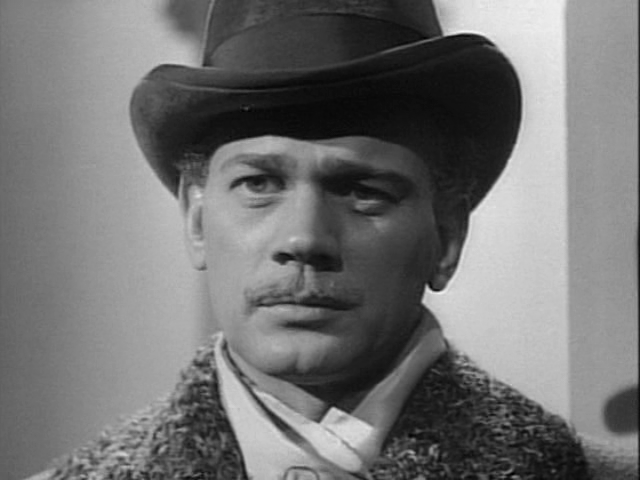
- Agnes Moorehead as Aunt Fanny
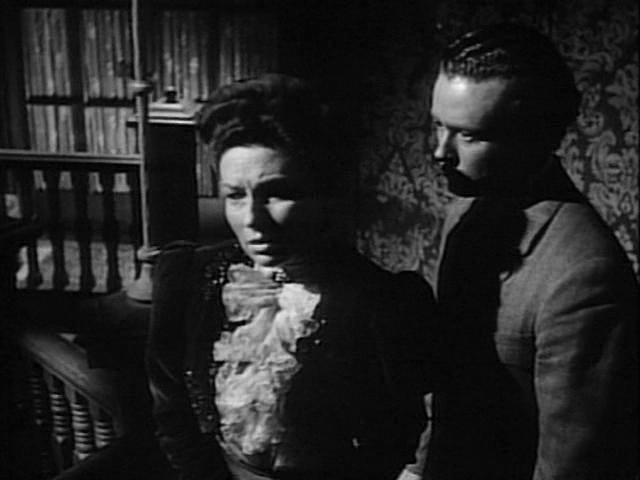
- Consistently creative direction by Welles
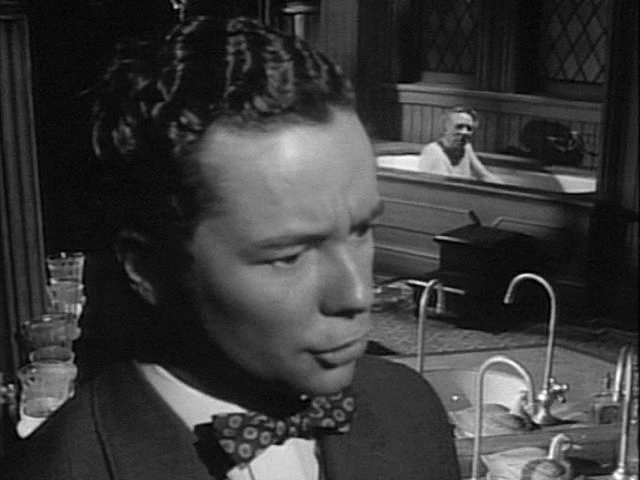
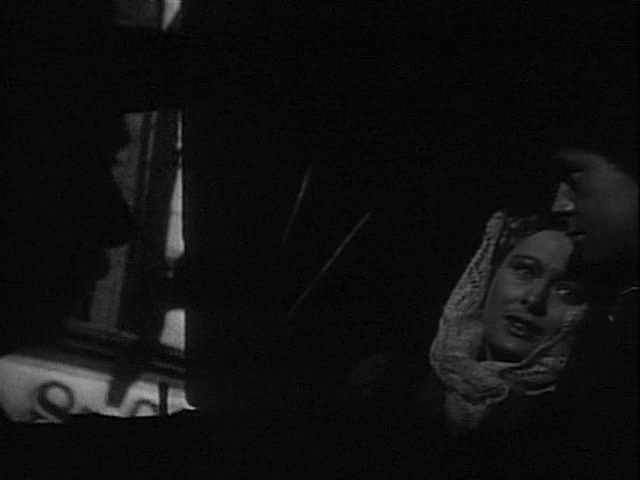
- Stanley Cortez’s impressive deep-focus cinematography


- Bernard Herrmann’s score
Must See?
Yes, as a unique — albeit flawed and disputed — American classic. Listed as one of the Best Pictures of the Year in Peary’s Alternate Oscars.
Categories
- Important Director
- Genuine Classic
(Listed in 1001 Movies You Must See Before You Die)
Links:
|







One thought on “Magnificent Ambersons, The (1942)”
A once-must, at least, as a recognized classic.
Hardcore ffs are no doubt familiar with the stories of ‘what happened’ to this film – even if some of what they heard may or may not be true. It’s certainly intriguing to speculate about the fate of 45 minutes of a film finished by Orson Welles. Having just rewatched it for the first time in a long time, I became curious as to what other information might now be online re: the alleged ‘hack-job’ that ‘TMA’ met in the editing room.
I came across two interesting pages containing info that may be of interest. For example, at this link, it’s revealed (among other things) that Welles encouraged a drastic cutting of the film:
http://mtatthemovies.blogspot.com/2009/11/decline-fall-of-magnificent-ambersons.html
As well, this other page reveals (also among other things), that the first-preview audience may simply have been the wrong audience for the film:
http://ambersons.com/FAQs.htm
It had been so long since my last viewing that I felt I was seeing the film with fresh eyes. It crossed my mind that ‘TMA’ is a rather somber film, really. It can perhaps be a little hard to detect that at first since the production design (great period detail all round!) and shimmering b&w photography emphasize the grandeur of the piece. Nevertheless, it’s on the heavy side with little let-up, which can be something of a hindrance for repeat viewings. Although the film has been cut excessively, the only major effect of that is the loss of some of the story’s texture (we seem to be without a few details, but it’s not difficult filling them in). The ending does come off as slightly jarring but much of that seems to be because it looks like the original DP did not shoot the scene (it seems lit in a flat way).
On the other hand, Welles’ direction is sharp and there are fine performances from the entire cast – esp. Baxter (this is some of her best, most natural work ever), Holt and Moorehead. Baxter is especially effective in the ‘goodbye scene’ in front of the drugstore. Holt and Moorehead have a number of (usually tense) scenes together and it’s fascinating watching them spar with one another.
Overall, there is much to admire about this film, making it one that ffs really do need to catch.